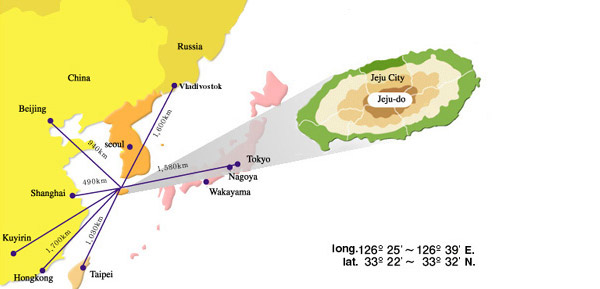 Land size : 1,845.92 งด Land size : 1,845.92 งด
 Population : 539,493 people (statistics from 2000) Population : 539,493 people (statistics from 2000)
Jeju-do or Jeju Island is one of the nine provinces of Korea and it is only an hour's flight south of Seoul . There are direct flights from Tokyo , Osaka , Nagoya , Fukuoka , Shanghai and Hong Kong .
As a result of its isolated location and romantic tropical image, Jeju-do has become a favorite retreat with honeymooners and tourists. Jeju Island , the largest island in Korea , came into existence 700 to 1,200 thousand years ago when lava spewed from a sub-sea volcano and surfaced above the waters. Then 100 to 300 thousand years ago another volcanic eruption that formed Mt. Halla , which is South Korea 's highest peak.
The island offers visitors a wide range of activities: hiking on Mt. Halla , catching sunrises and sunsets over the ocean, viewing majestic waterfalls, riding horses, or just lying around on the sandy beaches.

 Climate Climate
The island has a mild marine climate. It has four distinct seasons and an average yearly temperature of 15C.
 Transportation Transportation
Taxis and buses are the main transportation in Jeju. The taxi fare is approximately KRW 5,000 for a distance of 5 km (basic fare is KRW 1,600), and bus fare is KRW 900. Taxis are available at the main entrance of hotel. Shuttle bus service is provided for the delegates from the Ramada Hotel to Jeju Grand Hotel.
 Food Food
Foods from Jeju mainly made with saltwater fish, vegetables, and seaweed, and are usually seasoned with soybean paste. Salt water fish is used to make soups and gruels, and pork and chicken are used to make pyeonyuk (sliced boiled meat). The most well known fruit is the mandarin orange. Mandarin orange, were offered as presents to kings along with abalone as special products of Jeju. |




